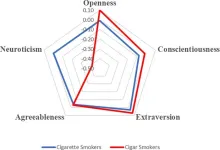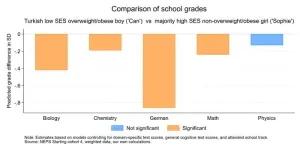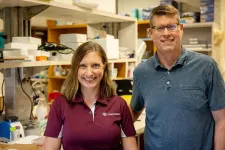(Press-News.org) Owning cryptocurrency may be associated with certain personality and demographic characteristics as well as a reliance on alternative or fringe social media sources, according to a study published July 3, 2024 in the open-access journal PLOS ONE by Shane Littrell from the University of Toronto, Canada, along with colleagues from the University of Miami, USA.
Anonymous trading and unregulated markets hallmark cryptocurrency’s unique subculture. While some consider the digital currency to be financially unreliable, hundreds of millions of global investors think otherwise.
This study identified various political, psychological, and social characteristics differentiating crypto investors from those who abstain. Existing studies (which generally include smaller sample sizes) profile crypto owners as psychologically non-normative and politically non-mainstream.
To test this, Littrell and colleagues polled 2,001 American adults in 2022, about 30% of whom responded “Yes” to owning or having owned crypto. Participants reported demographic information and other responses revealing their political, psychological, and social traits. The researchers conducted several bivariate (two-variable) correlational analyses, which measured how strongly crypto ownership is associated with other variables individually, as well as a multivariate (multi-variable) regression analysis, which attempts to identify the variables that are most important for predicting cryptocurrency ownership.
The correlational analyses showed that crypto ownership is associated with belief in conspiracy theories, support of political extremism, identification with non-left-right political orientations (e.g., Christian nationalism), and the “Dark Tetrad” of personality traits (narcissism, Machiavellianism, psychopathy, and sadism).
The more holistic analysis revealed which self-reported qualities are most likely to predict crypto ownership, the most strongly associated factor being a reliance on fringe social media sources for news. Other strongly associated characteristics included maleness, argumentativeness, higher income, and feelings of victimhood.
Across all survey data, crypto owners reported diverse political orientations and identities with a mix of left and right leanings.
The researchers acknowledge that the correlations they identified are limited by their sample of participants and the fact that they self-reported their characteristics, and cannot be interpreted as causal. Because of the strong correlation between social media and crypto ownership, they encourage future research into the influence of specific media or rhetoric on crypto ownership.
The authors add: “Though our results certainly do not apply to every crypto user out there, on average, we found that crypto investment and ownership tends to appeal to people who are more argumentative, anti-authoritarian, and prefer to get their news from non-mainstream social media sites. There is still much work to be done in this area, but we hope our study helps lay the groundwork for future research aimed at understanding the psychological, political, and behavioral factors associated with this growing financial movement.”
#####
In your coverage please use this URL to provide access to the freely available article in PLOS ONE: https://journals.plos.org/plosone/article?id=10.1371/journal.pone.0305178
Citation: Littrell S, Klofstad C, Uscinski JE (2024) The political, psychological, and social correlates of cryptocurrency ownership. PLoS ONE 19(7): e0305178. https://doi.org/10.1371/journal.pone.0305178
Author Countries: Canada, USA
Funding: This work was supported by the National Science Foundation (#2123635). The funders had no role in study design, data collection and analysis, decision to publish, or preparation of the manuscript.
END
Cryptocurrency investors are more likely to self-report “Dark Tetrad” personality traits alongside other characteristics
Crypto ownership was also associated with being male and high-income, consuming fringe media and reporting feelings of victimhood, in survey of 2,001 Americans
2024-07-03
ELSE PRESS RELEASES FROM THIS DATE:
Smoking behavior is linked to personality traits
2024-07-03
Cigarette smokers, cigar smokers, and non-smokers each have distinct personality profiles, according to a study published July 3, 2024 in the open-access journal PLOS ONE by Dritjon Gruda from Universidade Catolica Portuguesa, Portugal, and Jim McCleskey from Western Governors University, USA.
Tobacco use remains a formidable global public health challenge, responsible for more than 8 million deaths annually, including those attributed to second-hand smoke exposure. Emerging research underscores the critical role of psychological factors, including personality traits, in shaping ...
Minority status, social origin, gender, and weight can all count against a German kid’s grades
2024-07-03
A new study done in more than 14,000 ninth graders in Germany has revealed that students experience grading bias based on their gender, body size, ethnicity and parental socio-economic status. These negative biases stack on each other, meaning that students with multiple intersectional identities get significantly lower grades than their peers regardless of their true abilities. Richard Nennstiel and Sandra Gilgen of the University of Bern and University of Zurich in Switzerland present these findings in the open-access journal PLOS ONE on July 3, ...
Dengue linked to heightened short- and long-term risk of depression in Taiwan
2024-07-03
Analysis of the medical records of nearly 50,000 people who experienced dengue fever in Taiwan suggests that this disease is associated with elevated short- and long-term risk of depression. Hsin-I Shih and colleagues of National Cheng Kung University and National Health Research Institutes, Taiwan present these findings in the open-access journal PLOS Neglected Tropical Diseases.
People may develop dengue fever after being bitten by a mosquito carrying the dengue virus. Dengue fever can be mild, but it can also progress ...
Fighting COVID-19 with a cancer drug
2024-07-03
Twelve years ago, cancer researchers at University of California San Diego identified a molecule that helps cancer cells survive by shuttling damaging inflammatory cells into tumor tissue. In new research, they show that the same molecule does the same thing in lung tissue infected with COVID-19 — and that the molecule can be suppressed with a repurposed cancer drug. The work, published in Science Translational Medicine, represents a new approach to preventing irreversible organ damage in infectious diseases like COVID-19 and methicillin-resistant Staphylococcus aureus (MRSA).
The two key players in this scenario are inflammatory cells called myeloid ...
From ‘hit to vial’: Discovery and optimization of a promising vaccine adjuvant
2024-07-03
Many vaccines are only partially effective, have waning efficacy, or do not work well in the very young or the very old. For more than a decade, Ofer Levy, MD, PhD, and David Dowling, PhD, in the Precision Vaccines Program at Boston Children’s Hospital, have tried improving vaccines by adding compounds known as adjuvants to boost vaccine recipients’ immune responses.
Now, under a large Adjuvant Discovery Program contract from the National Institute of Allergy and Infectious Diseases ...
Why do you keep your house so cold? Science says: Ask your parents
2024-07-03
Childhood home temperature and community connectedness can help predict how U.S. residents set their thermostats, offering new ways to encourage energy conservation and combat climate change, according to a study published July 3 in the open-access journal PLOS Climate by Dritjon Gruda from the National University of Ireland Maynooth and Paul Hanges from the University of Maryland.
Half of U.S. households’ annual electricity use goes to heating and cooling, but less than half of homeowners tweak their thermostats to save energy ...
Texas A&M center receives $7.6 million grant to promote research in environmental health
2024-07-03
The Texas A&M Center for Environmental Health (TiCER), a National Institute of Environmental Health Sciences (NIEHS) Environmental Health Sciences Core Center, will be returning to the Texas A&M School of Veterinary Medicine and Biomedical Sciences (VMBS) with a $7.6 million grant for the center’s new funding cycle.
Under the new leadership of Dr. Weston Porter, a VMBS professor in the Department of Veterinary Physiology and Pharmacology, the center will promote research in four areas of environmental health — climate ...
Deep machine-learning speeds assessment of fruit fly heart aging and disease, a model for human disease
2024-07-03
BIRMINGHAM, Ala. – Drosophila — commonly known as fruit flies — are a valuable model for human heart pathophysiology, including cardiac aging and cardiomyopathy. However, a choke point in evaluating fruit fly hearts is the need for human intervention to measure the heart at moments of its largest expansion or its greatest contraction, measurements that allow calculations of cardiac dynamics.
Researchers at the University of Alabama at Birmingham now show a way to significantly cut the time needed ...
U.S. Department of Energy issues request for proposals for contractor to manage and operate Thomas Jefferson National Accelerator Facility
2024-07-03
Today, the U.S. Department of Energy (DOE) announced the issuance of a Request for Proposals (RFPs) for the competitive selection of a management and operating contractor for the Thomas Jefferson National Accelerator Facility (TJNAF).
TJNAF is a DOE national laboratory and DOE-sponsored Federally Funded Research and Development Center that has a mission focused on delivering breakthrough science and technology in nuclear physics.
DOE expects to award the contract before the current agreement with Jefferson Science Associates, LLC expires on May 31, 2025, allowing for an anticipated three-month transition. DOE expects the selected ...
Survivorship standards help address the distinct needs of adult cancer survivors
2024-07-03
Key Takeaways
More people are surviving cancer than ever before and living longer. This growing population of adult cancer survivors requires distinct survivorship services focused on long-term well-being.
Survey study demonstrates the value of American College of Surgeons’ survivorship accreditation standards, though specialized services in fertility and sexual health are less accessible.
CHICAGO — With the number of adult cancer survivors in the United States expected to reach 23 million by 2032,* the long-term needs of this ...
LAST 30 PRESS RELEASES:
Study in mice reveals the brain circuits behind why we help others
Online forum to explore how organic carbon amendments can improve soil health while storing carbon
Turning agricultural plastic waste into valuable chemicals with biochar catalysts
Hidden viral networks in soil microplastics may shape the future of sustainable agriculture
Americans don’t just fear driverless cars will crash — they fear mass job losses
Mayo Clinic researchers find combination therapy reduces effects of ‘zombie cells’ in diabetic kidney disease
Preventing breast cancer resistance to CDK4/6 inhibitors using genomic findings
Carbon nanotube fiber ‘textile’ heaters could help industry electrify high-temperature gas heating
Improving your biological age gap is associated with better brain health
Learning makes brain cells work together, not apart
Engineers improve infrared devices using century-old materials
Physicists mathematically create the first ‘ideal glass’
Microbe exposure may not protect against developing allergic disease
Forest damage in Europe to rise by around 20% by 2100 even if warming is limited to 2°C
Rapid population growth helped koala’s recovery from severe genetic bottleneck
CAR-expressing astrocytes target and clear amyloid-β in mouse model of Alzheimer’s disease
Unique Rubisco subunit boosts carbon assimilation in land plants
Climate change will drive increasing forest disturbances across Europe throughout the next century
Enhanced brain cells clear away dementia-related proteins
This odd little plant could help turbocharge crop yields
Flipped chromosomal segments drive natural selection
Whole-genome study of koalas transforms how we understand genetic risk in endangered species
Worcester Polytechnic Institute identifies new tool for predicting Alzheimer’s disease
HSS studies highlight advantages of osseointegration for people with an amputation
Buck Institute launches Healthspan Horizons to turn long-term health data into Actionable healthspan insights
University of Ottawa Heart Institute, the University of Ottawa and McGill University launch ARCHIMEDES to advance health research in Canada
The world’s largest brain research prize awarded for groundbreaking discoveries on how we sense touch and pain
Magnetofluids help to overcome challenges in left atrial appendage occlusion
Brain-clearing cells offer clues to slowing Alzheimer’s disease progression
mRNA therapy restores fertility in genetically infertile mice
[Press-News.org] Cryptocurrency investors are more likely to self-report “Dark Tetrad” personality traits alongside other characteristicsCrypto ownership was also associated with being male and high-income, consuming fringe media and reporting feelings of victimhood, in survey of 2,001 Americans







